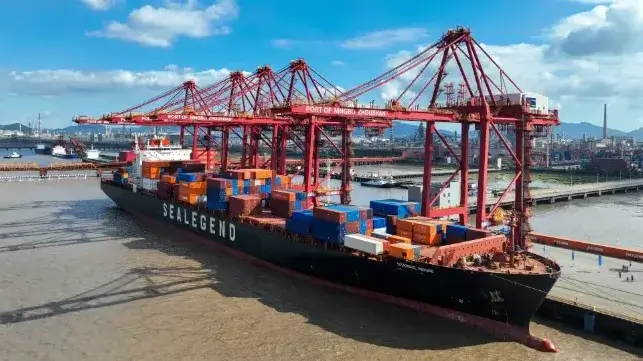Sea Legend's New China-Europe Arctic Shipping Service Draws Scrutiny

Chinese shipping startup Sea Legend is attracting attention with a new route to Europe via the Northern Sea Route, the Arctic shipping lane passing north of Siberia.
The new NSR service, dubbed "China-Europe Arctic Express," consists of a 25-year-old Panamax boxship dubbed Istanbul Bridge. The vessel departed Ningbo on September 22 and is due to reach Britain on October 10, 18 days later. After calling at Felixstowe, the vessel will proceed to Rotterdam, Hamburg and Gdansk. The launch of the express service is aimed at just-in-time delivery for the Christmas season in Europe.
A comparable voyage on the Suez route (assuming safe passage through the Red Sea) would take more than twice as long. This means less fuel burned and less carbon emitted for the same voyage, with lower cost than transcontinental rail service. It also has geopolitical advantages: for China, it is a long-sought new route to EU markets, and a symbolic victory for "Polar Silk Road" ambitions; and for Russia, it delivers on President Vladimir Putin's oft-repeated wish for higher traffic on the NSR.
Shipping services on the NSR are seasonal, limited to a matter of months in late summer. Ice clogs the eastern stretches of the route for most of the year. Russian icebreaker escorts can extend the season at the margins, but heavy ice precludes navigation in the depths of winter - for now, at least.
Istanbul Bridge is not an ice-class vessel; many of the Russian cargo ships that operate on the route are built to Russian Register ice class specifications. The ship started life in 2000 under Italian ownership, and it has changed hands and names many times. It has a history of minor inspection deficiencies in the last five years, but no detentions.
Three-year-old startup Sea Legend is no stranger to adventurous routing. It made its name in 2023-4 by running a regular service through the Strait of Bab el-Mandeb, managing the risk of Houthi attacks with the assistance of a Chinese PLA Navy escort.
Sea Legend has not disclosed its fuel selection for the new route. Though the CO2 advantages of the shorter route are considerable, environmental advocates with the Clean Arctic Alliance are skeptical that the new service offers an improvement. The IMO Arctic Treaty's heavy fuel oil ban does not take effect until 2029, and the alliance has asked for clarification on whether Sea Legend is carrying HFO or distillate, which would burn more cleanly in operation and dissipate more quickly in the event of a spill.
“With the Arctic already under severe stress, warming faster than the global average and acidifying faster than the global average due to global climate change, sending container ships across the Arctic sets off alarm bells," said Dr Sian Prior, Lead Advisor to the Clean Arctic Alliance. "CO2 reductions will be meaningless if shipping in the Arctic results in higher emissions of super-pollutant black carbon, which has a 1600 times greater climate impact than CO2 on a 20 year basis and a disproportionate impact when emitted near to snow and ice."
